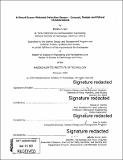A smart diaper wetness detection sensor : concept, design and ethical considerations
Author(s)
Sen, Pankhuri.
Download1342000085-MIT.pdf (19.81Mb)
Other Contributors
Massachusetts Institute of Technology. Engineering Systems Division.
System Design and Management Program.
Massachusetts Institute of Technology. Institute for Data, Systems, and Society.
Technology and Policy Program.
Advisor
Sanjay E. Sarma.
Terms of use
Metadata
Show full item recordAbstract
Human waste contained in diapers is a rich source of medical health based data. Embedding low-cost, wearable sensors in disposable diapers provides an opportunity for self-health monitoring and advancing preventative medicine. Diaper users include infants, elderly, disabled individuals, and hospital patients. Diaper wetness-based alerting can enhance care of this population by improving incontinence management, preventing rashes and infections, and avoiding embarrassment. A practical implementation of this consumer-oriented system will directly impact the user, their habits, ecosystem around the user, enhance access to health based information and disrupt the existing business models. Integrating ethical dimensions of privacy, safety, security, sustainability and socio-economic implications is essential to responsible technology development. In this thesis, we realize a novel sensor for moisture detection leveraging the material properties of the water absorbing polymer gel common to most disposable diapers. The proposed UHF RFID based sensor utilizes hydrogel for moisture sensing and as antenna element, thus creating a hybrid design uniquely composed of metal and hydrogel. The design optimized for smallest baby diaper geometry achieves a 1-meter read range, a bend radius of <20mm, is insensitive to sensor orientation relative to the reader, is low-cost, and can be integrated with existing diaper manufacturing units. An outlook on health applications enabled by a powerful diaper sensing system establishes the need for grounding future research with ethical considerations. We present a condensed narrative on understanding ethics, applied ethics, interplay of technology and society, the role of creators to subsequently detail the ethical considerations pertaining to development of IoT products and services. A method to administer the ethical considerations is extended and exemplified through our work on diaper moisture sensor.
Description
Thesis: S.M. in Engineering and Management, Massachusetts Institute of Technology, Engineering Systems Division, System Design and Management Program, 2020 Thesis: S.M. in Technology and Policy, Massachusetts Institute of Technology, School of Engineering, Institute for Data, Systems, and Society, Technology and Policy Program, 2021 Cataloged from PDF version of thesis. Includes bibliographical references (pages 85-90).
Date issued
2020Department
Massachusetts Institute of Technology. Engineering Systems Division; System Design and Management Program.; Massachusetts Institute of Technology. Institute for Data, Systems, and Society; Technology and Policy ProgramPublisher
Massachusetts Institute of Technology
Keywords
Engineering Systems Division., System Design and Management Program., Institute for Data, Systems, and Society., Technology and Policy Program.